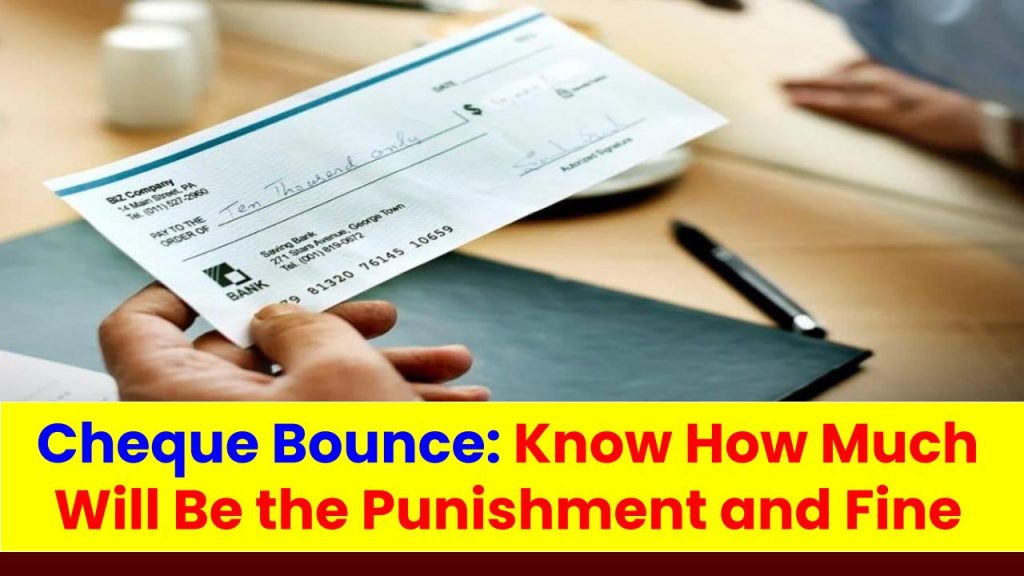
Imagine this: You write a cheque to someone, assuming there’s enough money in your account. But when the bank tries to process it, there are insufficient funds. The cheque bounces. What happens next?
A cheque bounce isn’t just a financial mishap—it can also land you in legal trouble. In India, it’s considered a criminal offense under Section 138 of the Negotiable Instruments Act, 1881. This article explains everything you need to know in a simple, easy-to-follow guide: from penalties and punishment to practical steps you can take to avoid or resolve a cheque bounce issue.
Cheque Bounce: Punishment and Fine
| Key Points | Details |
|---|---|
| What is Cheque Bounce? | When a cheque cannot be processed due to insufficient funds, signature mismatch, or account closure |
| Law Involved | Section 138 of the Negotiable Instruments Act, 1881 |
| Punishment | Imprisonment up to 2 years and/or fine up to twice the cheque amount |
| Cheque Bounce Charges | ₹150 to ₹750 (varies by bank) |
| Legal Remedy | The payee must issue a legal notice within 30 days |
| Common Causes | Insufficient funds, signature mismatch, expired cheque, overwriting |
Cheque bounce is not just a financial inconvenience—it’s a legal offense that can lead to fines, jail time, and damaged credibility. Whether you’re a salaried employee, business owner, or freelancer, knowing the rules around cheque issuance can save you from serious legal consequences.
Always keep enough balance, use digital payments when possible, and avoid issuing cheques casually. If you’re ever in a situation involving a bounced cheque—whether as a payer or a receiver—consult a legal professional immediately.
What is a Cheque Bounce and Why Does It Happen?
A cheque bounce occurs when the bank refuses to process a cheque due to one of several reasons:
- Insufficient balance in the account
- Signature mismatch
- Overwriting or tampering
- Cheque expired (older than 3 months)
- Account closed
Among these, insufficient funds is the most common cause—and the most serious from a legal point of view.
When your cheque is returned unpaid, the bank notifies both the payer (you) and the payee (the person you wrote the cheque to). But it doesn’t stop there.
see also: In How Many Days Will the Bank Return the Money If the Transaction Fails?
Legal Consequences of Cheque Bounce in India
Under Section 138 of the Negotiable Instruments Act, a bounced cheque due to insufficient funds is treated as a criminal offense. The law aims to protect the trust and credibility of cheque-based payments.
Penalties and Punishments:
- Imprisonment: Up to 2 years
- Fine: May extend to twice the cheque amount
- Court proceedings: Criminal case can be filed if the issue is not resolved
Important: These penalties apply only if the cheque was issued for the discharge of a legally enforceable debt or liability.
Example: If you gave someone a cheque for ₹50,000 to repay a loan, and it bounces, you could face a fine up to ₹1 lakh or even jail time.
Step-by-Step: What Happens When a Cheque Bounces?
Understanding the legal process is crucial, especially if you’re a business professional, contractor, or self-employed individual.
Step 1: Dishonour Memo
When the bank returns the cheque unpaid, it provides a “dishonour memo” to both the issuer and the payee explaining the reason.
Step 2: Legal Notice
The payee (recipient) must issue a legal notice to the drawer (issuer) within 30 days of the cheque bounce. This notice demands the payment within 15 days. If the drawer fails to pay within 15 days, the payee can file a criminal case under Section 138.
Step 3: Filing of Case
- The complaint must be filed within 30 days after the 15-day notice period expires.
- The matter goes to Magistrate Court.
- The court will summon the drawer and may order imprisonment and/or fine.
Bank Charges for Cheque Bounce
Banks charge penalties to both parties involved in the bounced cheque. Here’s a quick snapshot:
| Bank | Cheque Bounce Fee (Approx.) |
|---|---|
| SBI | ₹150 + GST |
| HDFC Bank | ₹550 + GST |
| ICICI Bank | ₹500 to ₹750 + GST |
| Axis Bank | ₹300 to ₹500 + GST |
Note: Charges vary depending on the account type and transaction history.
How to Avoid a Cheque Bounce
Whether you’re a business owner or an individual, avoiding cheque bounce is both a legal and reputational priority.
Practical Tips:
- Maintain Sufficient Balance: Always ensure funds are available before issuing a cheque.
- Use Digital Payments: UPI, NEFT, and RTGS eliminate cheque-related risks.
- Track Post-Dated Cheques: If you’ve issued PDCs, keep track of the due dates and maintain balance accordingly.
- Avoid Errors: Don’t overwrite or leave spaces. Write clearly and sign properly.
- Don’t Issue Blank Cheques: Even if you trust the person, a blank cheque can be misused.
What If You Receive a Bounced Cheque?
If you’re on the receiving end, here’s what you need to do:
Legal Steps:
- Collect the dishonour memo from your bank.
- Send a legal notice within 30 days via a lawyer.
- Wait 15 days for the response.
- File a criminal complaint if no payment is made.
You can also file a civil suit for recovery along with interest and damages.
Can a Cheque Bounce Case Be Settled Outside Court?
Yes. In many cases, parties settle out of court to save time and avoid criminal records.
- If the drawer pays the due amount along with charges, the complainant can withdraw the case.
- The court may also suggest mediation before proceeding with trial.
But remember, once the complaint is filed, the burden of proof lies on the drawer to justify their actions.
see also: In This Scheme of Post Office, You Will Get 10 Lakhs on Investing 5 Lakhs
Cheque Bounce FAQs
Q. Is cheque bounce a criminal offense?
Yes. Under Section 138 of the Negotiable Instruments Act, cheque bounce is a punishable criminal offense.
Q. What is the maximum punishment for cheque bounce in India?
Up to 2 years in jail or a fine twice the cheque amount, or both.
Q. Can I go to jail for a ₹5,000 bounced cheque?
Technically, yes. But courts often consider the amount, intent, and history before passing judgment. Small amounts may lead to fines rather than jail.
Q. What is the time limit to file a case?
A legal notice must be sent within 30 days of bounce. If no payment is made within 15 days, a case must be filed within the next 30 days.
Q. Can I stop a cheque I issued if I realize there are no funds?
Yes, you can request a stop payment. But this may still result in legal action if the cheque was issued for a legal debt.











